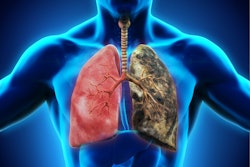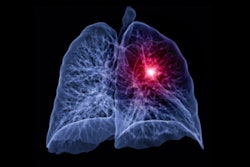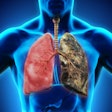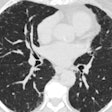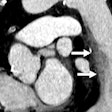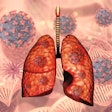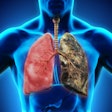Over a five-year period, a clinical practice lung cancer screening program at Duke University Medical Center in Durham, NC, found more disease than did the National Lung Screening Trial (NLST), researchers have reported.
The program showed a higher rate of lung cancer compared to the NLST’s, at 3.4% versus 2.4%. It also found more stage IV disease, wrote a team led by Kyle Lafata, PhD. The results were published April 23 in the Journal of the American College of Radiology.
“As LCS uptake increases, monitoring and tracking screening outcomes in clinical practice settings is key to high-quality screening and success,” the investigators noted.
Large studies such as the NLST and the Dutch-Belgian Lung-Cancer Screening Trial have shown that LDCT lung cancer screening reduces mortality from the disease. But how much clinical trial success “translates to routine clinical practice remains uncertain,” Lafata and colleagues explained.
To address the knowledge gap, the team conducted a five-year assessment of Duke’s LCS program, evaluating the frequency, type, and lung cancer stage in an LCS population and any association between patient characteristics and the Lung-RADS metric with disease diagnosis. The study included 3,326 patients who underwent 5,150 LCS exams between January 2015 and June 2020. The investigators tracked participants’ sociodemographic characteristics; Lung-RADS scores; incidence of pathology-proven lung cancers; and tumor characteristics using Duke’s electronic health records and its tumor registry.
Lafata and colleagues found the following:
- Over the study period, there were 118 LCS-detected cancers in 113 individuals, for a rate of 3.4%.
- Of the study participants, 102 (3.1%) were diagnosed with lung cancer within one year of screening, and 95.1% of these cancers were screen-detected.
- Of the LCS-identified cancers, 52% were adenocarcinomas, 55.9% were stage I, and 16.1% were stage IV.
They also reported the following:
| Lung-RADS’ efficacy for diagnosing lung cancer within 1 year of LCS | |
|---|---|
| Measure | Percentage |
| Sensitivity | 93.1% |
| Specificity | 83.8% |
| Positive predictive value | 10.6% |
| Negative predictive value | 99.8% |
Finally, the group noted that the clinical setting lung cancer screening practice found more cancer and more stage IV cancer than the NLST:
| Clinical setting LCS program compared with NLST results | ||
|---|---|---|
| Measure | NLST | Clinical setting LCS program |
| Overall frequency of screening-detected lung cancers | 2.4% | 3.4% |
| Stage IV cancers identified | 12.8% | 16.1% |
“Given that the burden of lung cancer may be higher in the clinical screening population than observed in clinical trials, efforts are needed to ensure appropriate downstream follow-up of positive screening results and care for patients with lung cancer,” the authors concluded.
The complete study can be found here.




